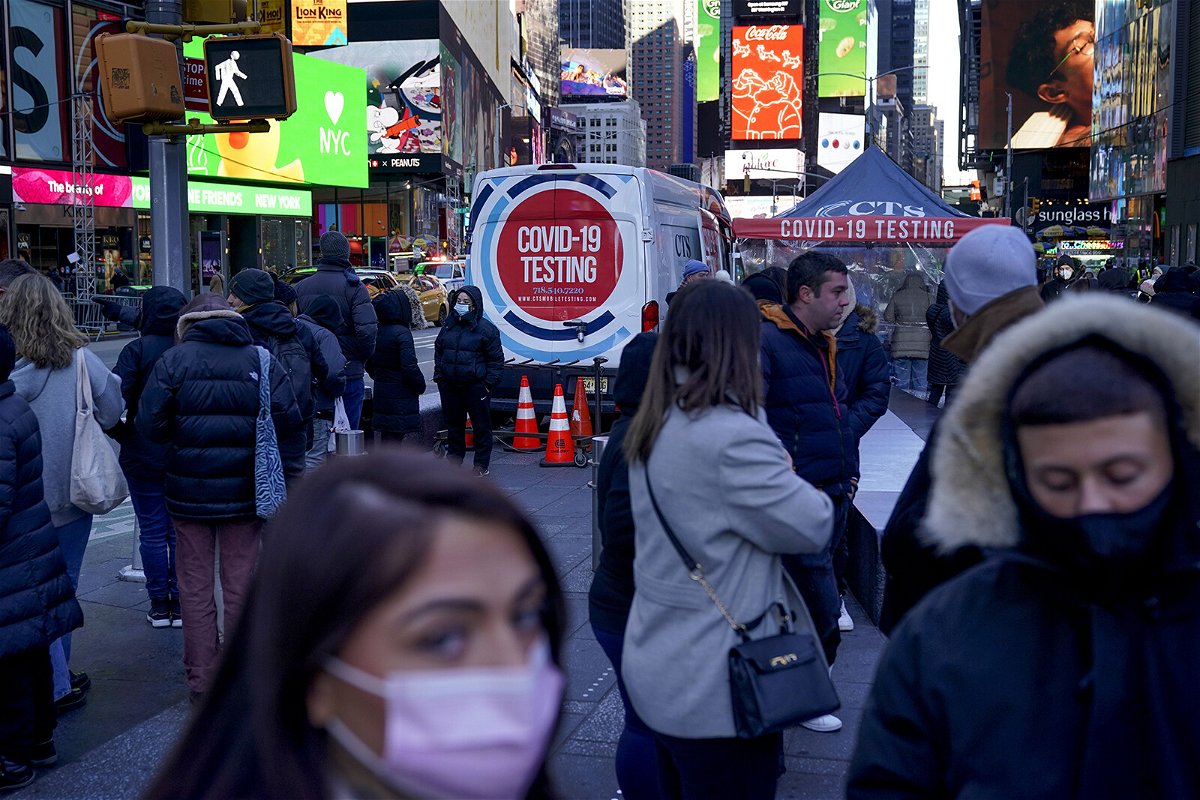Former Biden health advisers say the US needs to change its Covid-19 strategy to face a ‘new normal’

People wait in a long line to get tested for Covid-19 in Times Square
By Naomi Thomas, Virginia Langmaid and Jamie Gumbrecht, CNN
Former health advisers to President Joe Biden say the US strategy for the Covid-19 pandemic needs to be updated to face a “new normal” of living with the virus, rather than aiming to eliminate it.
In three pieces published in the Journal of the American Medical Association on Thursday, six former Biden advisers proposed a new plan and detailed strategies for testing, mitigation, vaccines and treatments.
“Without a strategic plan for the ‘new normal’ with endemic COVID-19, more people in the US will unnecessarily experience morbidity and mortality, health inequities will widen, and trillions will be lost from the US economy,” wrote Dr. Ezekiel Emanuel, a former Obama health adviser now with the University of Pennsylvania; Michael Osterholm, the director of the Center for Infectious Disease Research and Policy at the University of Minnesota; and Dr. Celine Gounder, an infectious disease expert at Bellevue Hospital Center and at Grossman School of Medicine at New York University.
All were appointed to Biden’s Transition Covid-19 Advisory Board in 2020.
For this new strategy, “humility is essential,” they wrote. There remain unknowns about the virus and its future, and “predictions are necessary but educated guesses, not mathematical certainty.” Leaders will have to communicate specific goals and benchmarks, and national plans will need to be adapted for local use.
They push for modernized data infrastructure to provide real-time information, a bolstered public health work force, more and empowered school nurses, and moves to rebuild trust in public health institutions. Substantial resources will be needed to “build and sustain an effective public health infrastructure,” they write.
In the article on testing, surveillance and mitigation strategies, Emanuel, David Michaels of the Milken Institute School of Public Health, and Rick Bright, a former Biomedical Advanced Research and Development Authority official now with the Rockefeller Foundation, called the initial response to the virus “seriously flawed.”
“Even now, testing results are not reliably linked with sociodemographic data, vaccination status, or clinical outcomes; the availability of reliable rapid tests remains limited; and prices are too high.”
The authors called for low-cost and accessible testing with immediate advice when someone receives a positive result; improved air and wastewater surveillance and genomic sequencing; and a voucher program for accessing N95 and KN95 masks.
The first step in viral mitigation, they said, is to keep people away from those who are sick.
“This requires systematic access to testing and paid sick and family medical leave for all US workers, especially low-wage, temporary, freelance, contractor, and gig economy workers.”
In a third piece, Dr. Luciana Borio, a former US Food and Drug Administration official now with the Council on Foreign Relations, Bright and Emanuel call for vaccine mandates, variant-specific vaccines and accelerated efforts to develop a universal coronavirus vaccines, as well as rapid development of effective oral antivirals. “Integral to achieving and sustaining this ‘new normal’ are both faster development and more efficient deployment of vaccines and therapeutics,” they write.
Some estimates suggest that 90% or more of people in the US need some immunity to SARS-CoV-2 to minimize the effects of Covid-19 and return to normalcy, they write. Currently, about 62.3% of the total US population — about 207 million people — is fully vaccinated. Mandates will be required, they say, adding that “few countries have ever achieved such levels of coverage of any vaccine without vaccination requirements.”
“Proposed vaccine requirements for government employees and contractors, health care and long-term care workers, and employees of businesses with 100 or more employees will be necessary to achieve levels of coverage to return to pre-COVID-19 life expectancy and social and economic vitality,” they said.
Some of the advisers have spoken in the past about the Biden administration’s Covid-19 response, including in February, when four advisers and other experts urged mandates around N95 masks in a memo to the US Centers for Disease Control and Prevention and the Occupational Safety and Health Administration.
The-CNN-Wire
™ & © 2022 Cable News Network, Inc., a WarnerMedia Company. All rights reserved.
